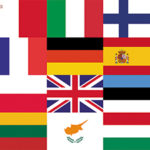92 percent respondents said they tended to feel comfortable with neighbours of a different religious background.
Vienna: A survey of Muslims in 15 European Union countries finds most are willing to embrace people of other faiths, but they often feel rebuffed by the majority populations of the places they live.
The findings released recently by the European Union Agency for Fundamental Rights reflect the views of 10,527 Muslim immigrants and children of immigrants who were interviewed between October 2015 and July 2016. Nine out of 10 of those surveyed reported having friends from other religious communities and 92 percent said they tended to feel comfortable with neighbours of a different religious background.
But more than half “ 53 percent “ said they had felt discriminated against when they looked for housing because of their names. On the employment front, 35 percent of the women who had looked for work felt discriminated against because of their clothing, compared to 4 percent for men.
The people surveyed were over age 16 and had been living for at least a year in Austria, Belgium, Cyprus, Germany, Denmark, Greece, Spain, Finland, France, Italy, Malta, the Netherlands, Sweden, Slovenia and the United Kingdom.
“ Nearly half of the respondents did not find interfaith marriage objectionable, with 48 percent reporting they would feel “totally comfortable” with a family member marrying a non-Muslim.
At the time of their survey interviews, 27 percent of respondents said they had experienced harassment because of their Muslim backgrounds during the previous 12 months. Another 2 percent reported being physically assaulted.
Of the Muslim women who wore headscarves or face veils, 31 percent reported harassment. Inappropriate staring or offensive gestures were reported by 39 percent of the women who wore the coverings, while 22 percent said they were targets of offensive comments and 2 percent said they were physically attacked. For women who did not wear veils or headscarves, harassment was experienced by 23 percent.
The survey participants came from or had at least one parent originally Turkey, North Africa, Sub-Saharan Africa, South Asia and Asia. In two countries, respondents also included Muslims from other countries outside Europe who had immigrated within the previous 10 years.
The European Union Agency for Fundamental Rights said the survey had “multiple margins of error” since results were calculated differently for each ethnic group and country and because Muslims living in areas with fewer immigrants may not have been reached.


COMMENTS